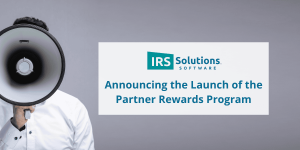CPAs and tax professionals always look for ways to get ahead, add value, and better serve their clients. Specialization in the lucrative field of IRS tax resolution services is one option that has attracted much attention in recent years. Another is becoming credentialed and working as an Enrolled Agent (EA). Is a career as an Enrolled Agent the right path for you? The expert IRS Solutions team is here to walk you through key aspects of becoming and working as an Enrolled Agent, ensuring you have all the information you need to make an intelligent decision.
What is an IRS Enrolled Agent?
Enrolled agent status is the highest credential bestowed by the IRS. An IRS Enrolled Agent is a federally licensed tax practitioner authorized to represent taxpayers before the Internal Revenue Service. This privilege is granted upon successfully passing a rigorous three-part examination or having previous experience working for the IRS. Enrolled Agents assist clients in managing tax compliance and resolution.
How Much Does an Enrolled Agent Make?
Salaries for Enrolled Agents can vary, but on average, they earn between $57,000 to $97,000 annually. The specific income depends on experience, specialization, and location.
Enrolled Agent vs CPA Salary
While CPAs generally have a broader scope of work and often command higher salaries, experienced EAs, especially those specializing in tax resolution, can earn comparable amounts.
How Much Do Enrolled Agents Make During Tax Season?
Tax season is lucrative for IRS tax professionals, including EAs. Many earn a significant portion of their annual income during this period, ranging from $5,000 to $15,000 a month, based on client volume and complexity of cases.
Steps to Become an Enrolled Agent
Becoming an Enrolled Agent is as easy as 1-2-3-4!
- Pass the Special Enrollment Examination (SEE) or provide evidence of prior IRS experience.
- Obtain a PTIN.
- Undergo a background check.
- Maintain tax compliance.
How Long Does It Take to Get Enrolled Agent Licenses?
Typically, the process of becoming an Enrolled Agent can span from a few months to up to a year. This timeframe includes the duration required for studying for the Special Enrollment Examination, the examination itself, and the processing time for the background check.
Enrolled Agent Training
Enrolled Agent training typically covers comprehensive tax law topics. Numerous institutions offer specialized courses to prepare candidates for the EA exam and equip them with the knowledge and skills for handling future tax resolution scenarios.
Enrolled Agent Tax Compliance Check
As part of the Enrolled Agent credentialing process, a thorough review will be conducted to ensure the candidate has consistently complied with tax laws.
Enrolled Agent PTIN
Every Enrolled Agent must obtain a Preparer Tax Identification Number (PTIN) from the IRS. This unique identifier allows them to prepare federal tax returns legally. PTINs require annual renewal.
IRS Enrolled Agent Renewal
Enrolled Agents are required to renew their license every three years. This renewal process ensures they have fulfilled the Continuing Education (CE) requirements and maintained tax compliance.
How to Renew Enrolled Agent License
You need to renew your license every three years. Renewal requires submitting IRS Form 8554 and paying all associated fees.
Enrolled Agent CPE Requirements – CE Requirements
Enrolled Agents must complete 72 hours of Continuing Education (CE) within the three-year licensing period, with a minimum of 16 CE hours annually. This ensures the Agent remains current with the ever-evolving tax laws and regulations, enabling them to continue delivering expert services to their clients.
Enrolled Agent Tax Services
In addition to representation before the IRS, EAs can offer a wide range of services, from return preparation to audits and tax resolution.
Enrolled Agent vs Tax Preparer
While Enrolled Agents and paid tax preparers assist clients in managing tax-related matters, EAs are federally licensed to represent taxpayers before the IRS. In contrast, tax preparers, lacking additional credentials, have limited representation rights.
What is an Enrolled Agent Tax Preparer?
An Enrolled Agent Tax Preparer is an Enrolled Agent who specializes in the preparation and amendment of tax returns. They are dedicated to ensuring clients comply with tax laws and take full advantage of available deductions.
How to Become an EA Tax Preparer
To become an Enrolled Agent specializing in Tax Preparer, the following steps are typically involved:
- Obtain Enrolled Agent Status: Start by securing Enrolled Agent status, which involves passing the Special Enrollment Examination (SEE) and meeting the IRS requirements.
- Specialize in Tax Preparation: After becoming an Enrolled Agent, further your expertise in tax preparation by taking specialized courses designed to enhance your knowledge and skills in this area.
- Gain Practical Experience: Gain hands-on experience working with various tax scenarios, helping clients navigate their tax obligations and optimize their financial positions. This practical experience will help you become a proficient Enrolled Agent Tax Preparer.
Is an Enrolled Agent an Accountant?
While many Enrolled agents have a background in accounting, achieving Enrolled Agent status indicates expertise in tax representation.
How to Become an EA Accountant
After attaining the status of Enrolled Agent, you can further specialize in tax accounting through ongoing education and practical experience, becoming an Enrolled Agent with an accounting emphasis.
Is an Enrolled Agent a CPA?
No, they are not the same. While both titles are well-respected in the tax world, whereas Enrolled Agents specialize in tax representation, CPAs typically have a broader scope of accounting and auditing practices.
Is an Enrolled Agent Better Than a CPA?
Neither credential holds superiority; the choice depends on your professional and personal goals.
Enrolled Agent Tax Accountant
Some Enrolled Agents dive deep into tax accounting, often helping businesses optimize their financial strategies in line with tax regulations.
Harnessing the Power of Technology: The Future for Enrolled Agents
The most successful Enrolled Agents leverage modern tools in today’s fast-paced digital era. EAs can significantly enhance their efficiency, precision, and service quality by adopting specialized tax resolution software. Here are some key features to consider:
- Optimized Solution Recommendations: Enrolled Agents no longer need to sift through mountains of data. Modern software can provide instant, tailored solution recommendations (Offer in Compromise, Installment Agreement, or Currently Not Collectible status) based on a client’s unique tax situation, allowing for quicker and more effective resolution strategies.
- Proactive IRS Transcript Monitoring: Time is of the essence in tax resolution. EAs who take advantage of automated IRS transcript monitoring are alerted to any changes or updates, including impending audits, ensuring they can respond proactively and keep their clients informed.
- Bulk Transcript Downloads: Save time by swiftly retrieving data for multiple years and clients within seconds, accompanied by comprehensive and easy-to-read reports.
- Automated Bankruptcy Discharge Date Calculations: Determine if and when tax debts can be discharged in bankruptcy with the push of a button.
If you’re interested in exploring how a digital tax resolution platform can revolutionize your work as an Enrolled Agent, we invite you to Schedule a demo of IRS Solutions and witness the future of tax resolution.







